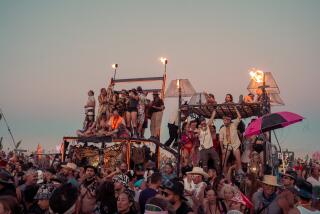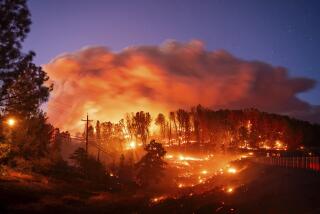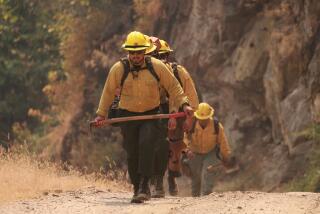A COVID-safe interactive outdoor theater explores California’s fire season and life in 2020
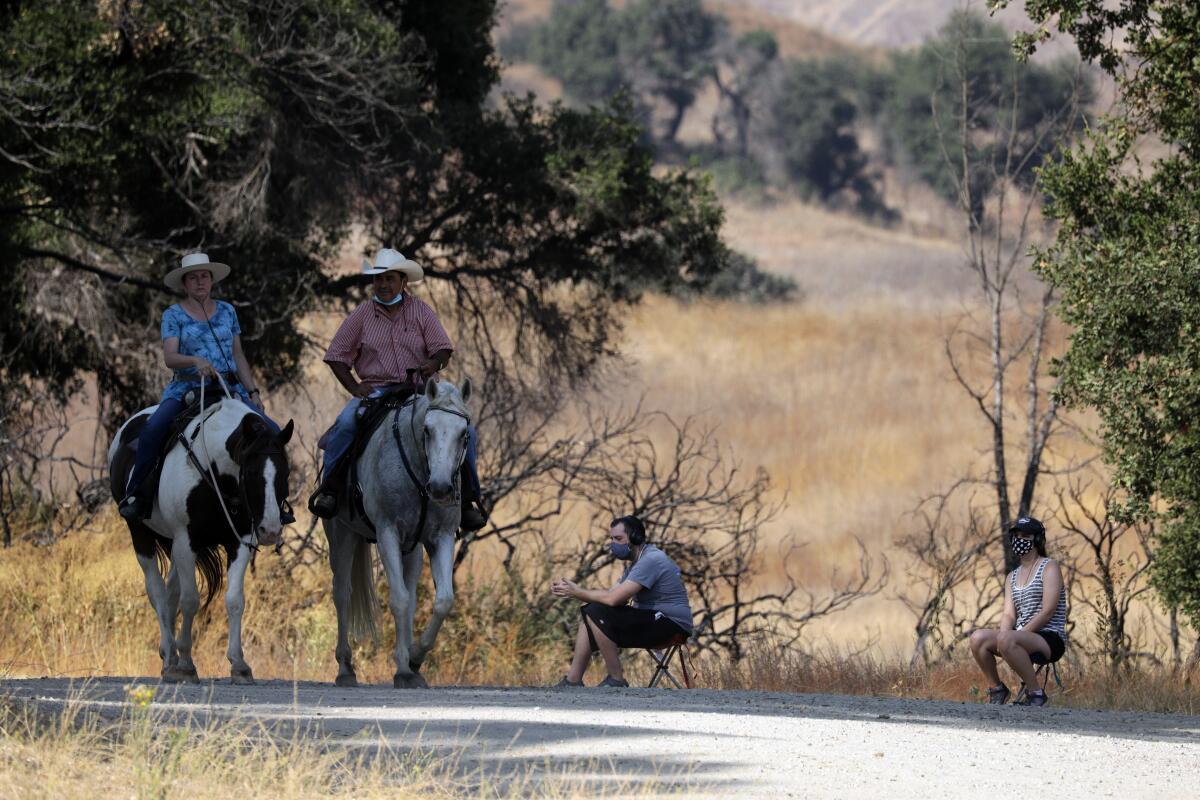
The map that greets guests at the Paramount Ranch, once home to a scenic Western town before it was decimated by the 2018 Woolsey fire, is almost obstinately cheerful amid rolling heat waves that have brought deadly, devastating blazes throughout the West.
“Welcome to ‘Fire Season!’ ” it reads.
Yet the sign’s exclamation point amid our state’s worst fire season on record feels less like a willful contradiction than an acknowledgement that we’re all becoming too accustomed to yearly, overwhelming flames and the life-altering effects of climate change. Have we become defeated, rather than viewing the events around us as a call to action?
These are some of the questions that arise in a new participatory performance piece that tackles, from a personal perspective, our climate crisis. “Fire Season” looks at how our relationships are shaped by our rapidly changing environment — and how we often try to ignore it.
Creators Lauren Ludwig and Monica Miklas, of the immersive theater company Capital W, cite the literature of John McPhee and games such as “The Legend of Zelda” as an influence on the audio-driven work, all while seeking to have up to eight participants at a time ponder the realization that “progress is not inevitable.” As writer and performer Monica Miklas says at one point, her voice coming through an FM transmitter as if broadcast from a pirate radio station, “Does the world seem hotter than when you were a child?”
While initially conceived before our current COVID-19 pandemic, the work is decidedly timely, reflective of an era when the loss of life can feel overwhelming to the point of paralyzing.
“It feels right to me in this moment, where we are in the midst of crisis, to pause, and to have a moment of stillness,” says Miklas. “We can be overwhelmed by disaster and the suffering of human beings, but I think with fires there’s a real feeling of devastation about the land, too, so being in connection with nature and taking a moment to be with the land I think can be very healing.
“That means,” adds Miklas, “going toward those feelings and not away from them.”
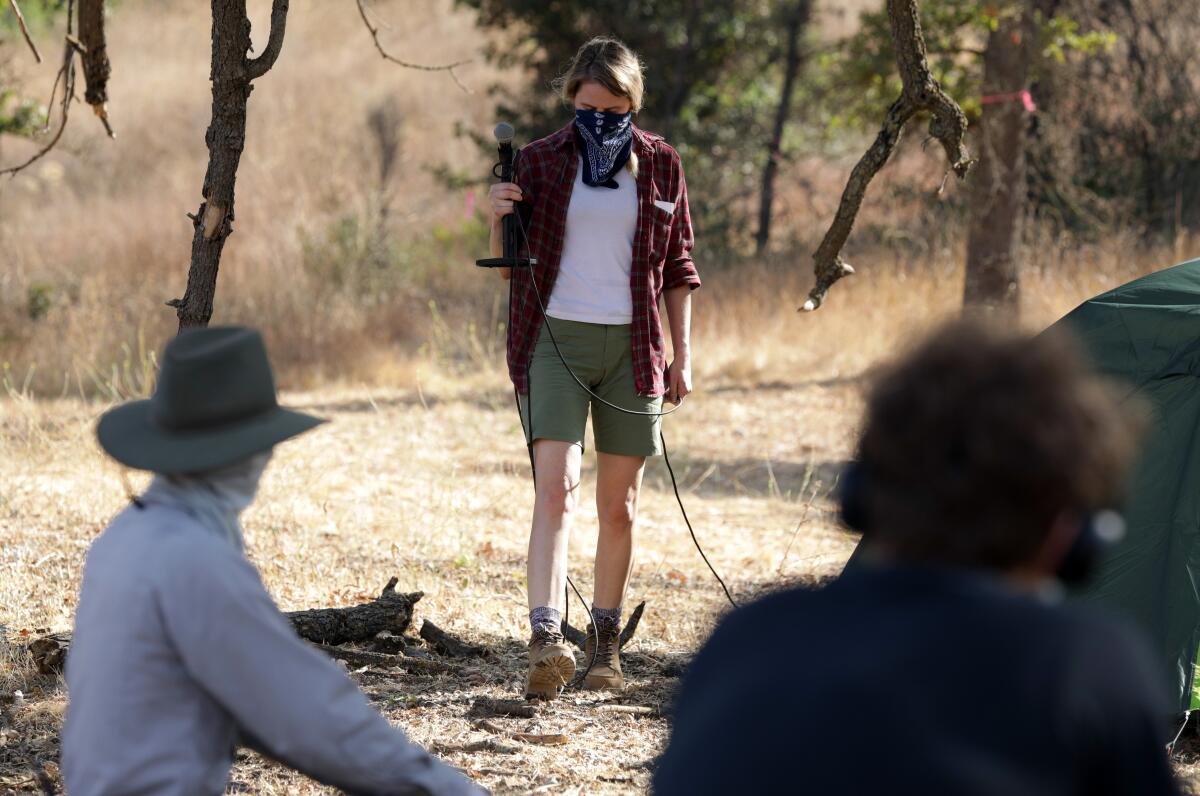
The works of Miklas and Ludwig focus on providing a sense of autonomy to the audience. Their previous and best-known show, “Red Flags,” was an one-on-one work of immersive theater that sought to explore the awkwardness that comes from the sudden and false sense of familiarity of a first date. They wanted attendees to think about how we present ourselves to someone new. In the words of Ludwig, who is “Fire Season’s” director and producer: “How do we win or lose a date?”
Theater isn’t entirely the best way to frame “Fire Season” or “Red Flags,” though the shows lean heavily on the medium. “Red Flags” was essentially a live-action role-playing game, and was presented at last year’s independent game festival IndieCade, which seeks to show how play is evolving as a storytelling medium to cross formats and genres.
“Fire Season” uses play as a discovery tool. Guests arrive at Paramount Ranch and are outfitted with a disinfected FM transmitter as well as a backpacking chair and are told simply to wander. No maps are given, and the only instruction is that if one strays too far, the radio feed will start to cut out. At times, Miklas directs the audience to stop and sit, or to pick up the dried leaves that surround the area.
At first I was nervous about becoming lost, but Ludwig wanted a sense of apprehension and adventure that can’t be provided by simply sitting passively in an audience. She wanted the show’s opening moments to feel akin to booting up an open-world, sandbox video game, in which players are presented with a universe and few directions, then told to go play.
“I grew up playing a lot of ‘The Legend of Zelda,’ and I will always be inspired by an open landscape,” Ludwig says. “Like, I’m setting off with my pack and I go. But I don’t do a lot of hiking alone. I think I’m actually a little scared of the outdoors and what I don’t know, and I think it’s easy when you’re a city dweller to, when you get into nature, stick to what feels completely safe. Or do you go on a path someone else told you to go on?”
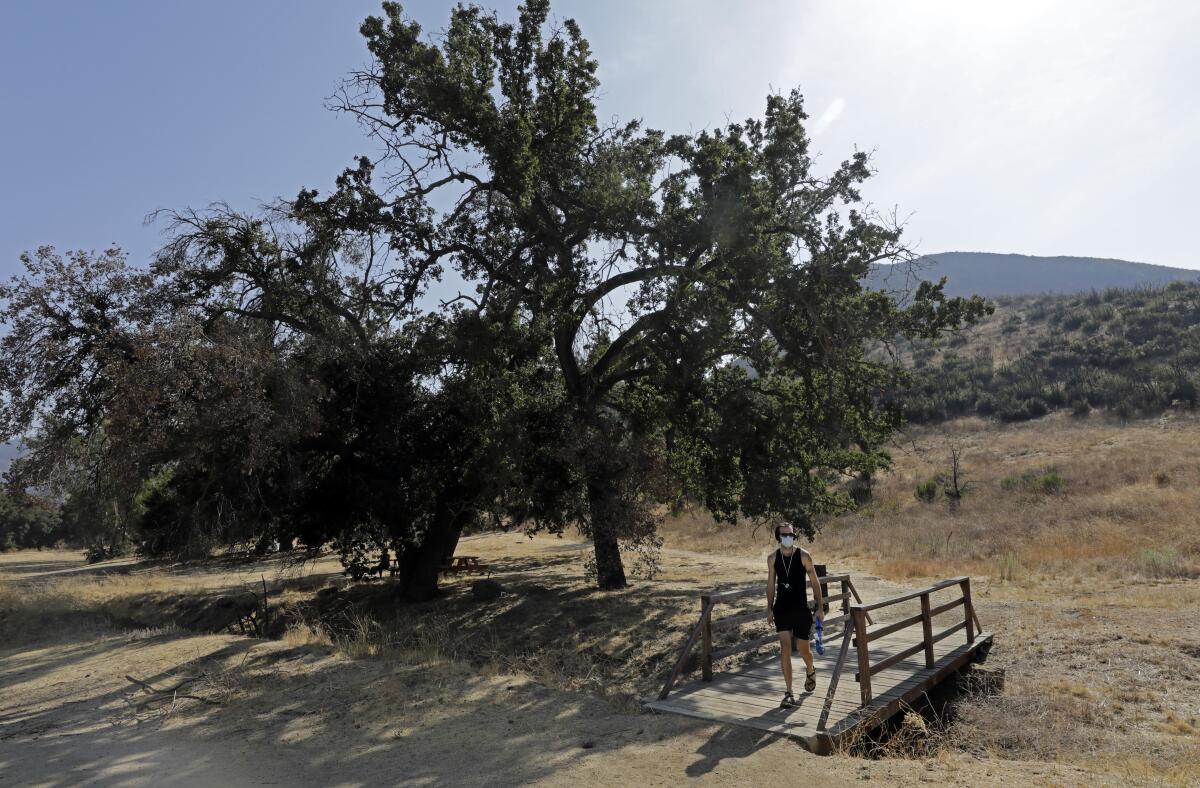
Working with the National Park Service, says Ludwig, was a breeze compared to trying to stage a show in a mixed-use Los Angeles building. Most of the questions were related to the ability to keep an audience small and distanced amid our pandemic. Paramount Ranch worked for two reasons. One, says Ludwig, they wanted audiences to be on a recent burn site, but they also wanted a space with multiple short trails rather than a setting where audiences would need to go on a fixed path.
“We wanted people to come in and get gear that made them feel like they were going on an outdoor adventure,” Ludwig says. “We want them to feel like they’re a protagonist in their own game. That’s why we give them hiking stools. And when you start out, you have to immediately make a choice. Do you go left or right or straight? That’s engaging people more directly with the land, but one that’s safe because they can’t wander further than the broadcast can reach. It puts you in the mindset where you’re taking responsibility for yourself.”
On Sunday, veteran park ranger Ken Low, who has been with the Santa Monica Mountains National Recreation Area for nearly 30 years, took in the show. While he was there primarily for work, to ensure that the production adhered to the agreed-upon guidelines, he says he came away a fan of his first-ever immersive theater experience.
Low says the park will check in on each performance, which runs weekends through Oct. 25, simply making sure guests don’t wander somewhere they shouldn’t. As it’s a recent burn site, walking off a path is a no-go.
‘Raji: An Ancient Epic’ is a beautiful action-adventure game that brings to life the myths and folklore of India.
“I was really impressed with the content and how it matched so much with the topics that we try to interpret in our national park system,” Low says. “Climate change, Mediterranean-type systems, vegetation, fires — she covered a lot of the points that we try to help people understand so they can better know their parks, and she did this while trying to meet her goal of being an artist. I like how she balanced the two.”
We learn about how fires will permanently alter the biodiversity of a region — which can lead to more fires amid our rising temperatures. But mostly “Fire Season” is a way to connect our lives, our loves and the passing of time to an increasingly stressful world.
Indeed, Miklas has a personal connection to forest fires; the production was inspired by the threat the 2017 Thomas fire posed to the home of her parents. And members of her extended family were displaced by this year’s Creek fire, which tore through the Sierras.
Prior to the pandemic, Miklas and Ludwig were debating how to present it, even doing table reads with others reading Miklas’ words. The physical distancing realities of our current moment, however, solidified the idea of a live FM broadcast, which Miklas reads from an out-of-view tent.
Pandemic or not, this seems like the show in its truest form. The idea of Miklas being out of sight for the production’s first 45 minutes drives home the idea that our world, if we don’t intervene, is increasingly becoming inhospitable.
Lost rabbits and a missing nighttime rave: An insider’s look at how a “Fall Guys” course is made from start to finish with level designer Megan Ralph.
As I walked Paramount Ranch, I definitely had games on my mind — but less “Zelda” and more the post-apocalyptic kind. “An impulse behind making it radio is that radio gets used in emergencies,” says Ludwig. Adds Miklas, “In my mind, I imagine the person would be continuing to do this broadcast even when L.A. becomes some sort of wasteland. She would continue to try to reach out.”
If that sounds bleak, know that a course of optimism runs through “Fire Season.” The most striking line of the show, for instance, is relatively early when Miklas declares, “My love is a protest,” and she talks about feeling passion amid the many horrors of life in 2020. She dismisses pop culture, slamming “Sex and the City” and its visions of noble-class perfection and selfishness.
“Fire Season” wants us to look at what we’ve been using as a distraction and an escape, but also to fully embrace life, to not let challenges turn into passivity. And the hits in 2020 keep coming: A week before “Fire Season” began previews, Miklas was laid off from her day job.
“Joy is a protest,” says Miklas. “Radical joy in the face of disaster is a choice. We can, despite all of this, we can choose hopefulness and joy. It’s a middle finger: ‘No one is taking that from me.’ All the things I thought my future would be have been taken from me, but they can’t take this.”
'Fire Season'
More to Read
The biggest entertainment stories
Get our big stories about Hollywood, film, television, music, arts, culture and more right in your inbox as soon as they publish.
You may occasionally receive promotional content from the Los Angeles Times.
